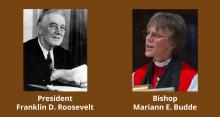
Photo by Liz Falconer / Unsplash License

Photo by Liz Falconer / Unsplash License
This section of the website contains essays, book reviews, and links to material that discusses the ‘science’ of racism as it relates specifically to structures of American society.
The pages encourage discussion that is helpful in understanding how structures like the laws, regulations, court decisions, and the Constitution support and preserve American racism.
The website builds a community based on three facts that social scientists have discovered about racism. The first is that our social organization is based on structures that humans create and sustain. This is sometimes called the social construction of reality. Regarding racism, this means people created it. People can end it.
In March, we celebrate Women’s History Month, a time to reflect on the generations of women who have fought for equality, challenged injustice, and reshaped our world. Their work has been as diverse as the women themselves – spanning movements for voting rights, labor protections, education, civil rights, and more.
Many times, their names have been forgotten or their impact understated. Today, we honor them. We say their names.
Last month, multiple organizations in Philadelphia honored Bayard Rustin’s crucial but overlooked contributions to the Civil Rights Movement. Read about the outcomes of this two-day event, where we gathered at the University of Pennsylvania to explore the reasons given for Rustin’s legacy being diminished, how these struggles fueled the AIDS crisis of the 1980s, and how social justice advocates are and can continue to apply the lessons learned from Rustin’s story.

President Franklin D. Roosevelt is credited with initiating the concept of The First 100 Days during his radio address to the nation on July 24, 1933, as he announced the New Deal. The best lesson we can take for how to deal with the First 100 Days of this administration comes from him and Bishop Mariann Budde. Their approach to leadership requires acknowledging that fear must not be an option to action.

Former President Jimmy Carter died on December 29, 2024. Previously, his family reported he had fulfilled a desire to live long enough to cast an absentee ballot for a woman of color to become an American president. It should not surprise us that it was important to Carter that he take this personal action.
Multiple organizations in Philadelphia will join forces to organize a powerful two-day program honoring Bayard Rustin’s crucial but often overlooked contributions to the Civil Rights Movement. As Dr. Martin Luther King Jr.'s advisor and an openly gay Black man, Rustin faced significant erasure due to homophobia and political suspicion.

On October 20, 2024, at 9:30 a.m., descendants of the 1864 Sand Creek massacre of Cheyenne and Arapaho Native Americans gathered around a flagpole in Riverside Cemetery in Denver, Colorado. Ken Bedell shares his experience at the Commemoration of the 1864 Sand Creek Massacre and his visit to the History Colorado Center.